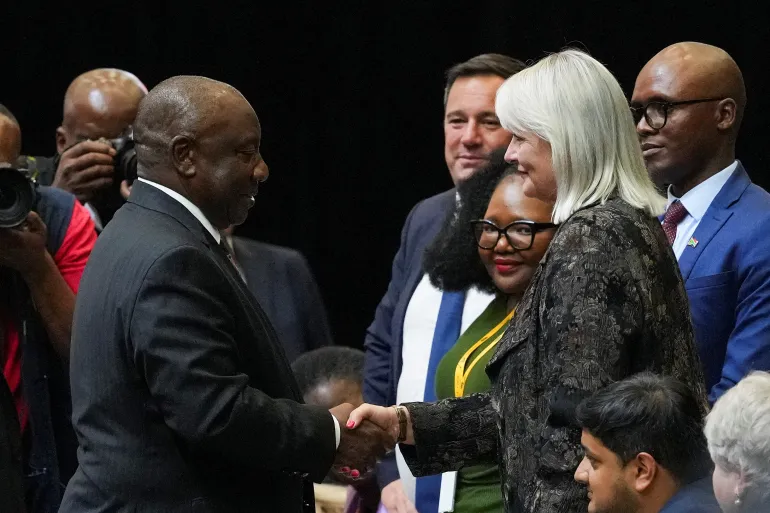South Africa Faces Tensions and Standoffs in Effort to Form Coalition Government
Johannesburg, South Africa
Nearly a month has passed since South Africa’s landmark national elections, which saw the African National Congress (ANC) lose its majority for the first time. The ANC, forced to form a coalition to govern the country, now faces a critical deadlock over the allocation of cabinet positions, threatening to derail the entire process.
The Struggle to Form a Coalition
The ANC, historically the dominant party in South Africa’s political landscape, entered into tense negotiations with the Democratic Alliance (DA), the second-largest party, to form a Government of National Unity (GNU). These negotiations, crucial for establishing a functional coalition government, have been fraught with challenges and delays.
The primary sticking point has been the allocation of key cabinet positions. Both the ANC and the DA are vying for influential roles within the government, leading to a standoff that has hindered the formation of a cohesive cabinet. This impasse has delayed President Cyril Ramaphosa’s announcement of his cabinet, further complicating the situation.
Historical Context
The ANC’s loss of its parliamentary majority marks a significant shift in South Africa’s political dynamics. Since the end of apartheid in 1994, the ANC has been the ruling party, with Nelson Mandela and his successors leading the nation through its transition to democracy. However, recent years have seen growing dissatisfaction with the ANC’s governance, leading to a decline in its voter base.
The 2023 elections were a turning point, as voters expressed their frustration with issues such as corruption, economic stagnation, and high unemployment rates. The rise of the DA and other opposition parties signaled a demand for change and greater accountability in government.
The Negotiation Process
Negotiations between the ANC and the DA have been intense, with both parties seeking to assert their influence within the GNU. The allocation of cabinet positions is particularly contentious, as these roles will determine the direction of key policies and the implementation of reforms.
The ANC, under President Ramaphosa’s leadership, aims to retain control over critical ministries, including finance, defense, and home affairs. The DA, meanwhile, is pushing for significant representation in areas such as health, education, and economic development. The balance of power within the cabinet will be crucial in shaping South Africa’s future policies and addressing the pressing issues facing the nation.
The Impact of Delays
The delays in forming a cabinet have created uncertainty and concern among South Africans. The country faces numerous challenges, including economic recovery post-pandemic, social inequality, and addressing systemic corruption. A stable and functional government is essential for tackling these issues effectively.
The prolonged negotiations have also affected investor confidence and the country’s economic outlook. Business leaders and international observers are closely monitoring the situation, as political stability is a key factor in driving economic growth and attracting foreign investment.
The Role of President Ramaphosa
President Cyril Ramaphosa, who has been a central figure in South African politics, is tasked with navigating this complex coalition-building process. His leadership and ability to broker a compromise between the ANC and the DA will be critical in ensuring a smooth transition to a coalition government.
Ramaphosa’s background as a trade union leader and businessman provides him with unique insights into both political negotiation and economic management. However, the current deadlock presents one of the toughest challenges of his presidency. Successfully forming a coalition government will not only solidify his legacy but also set a precedent for future political cooperation in South Africa.
The Broader Implications
The formation of a coalition government in South Africa has broader implications for the country’s democratic institutions and political culture. It represents a shift towards greater political pluralism and the need for collaborative governance. If successful, the coalition could pave the way for more inclusive and representative politics in South Africa.
However, failure to resolve the current deadlock could lead to political instability and further erode public trust in the government. It is crucial for the ANC and the DA to find common ground and prioritize the nation’s interests over partisan agendas.
Conclusion
South Africa stands at a pivotal moment in its political history. The formation of a coalition government, while challenging, offers an opportunity to address the country’s pressing issues through collaborative governance. The ongoing negotiations between the ANC and the DA are critical in shaping the future of South Africa’s democracy.
As the world watches, the successful resolution of this deadlock will demonstrate the resilience of South Africa’s democratic institutions and the commitment of its leaders to serving the nation’s best interests. The outcome of these negotiations will have a lasting impact on the country’s political landscape and its journey towards a more inclusive and equitable society.

